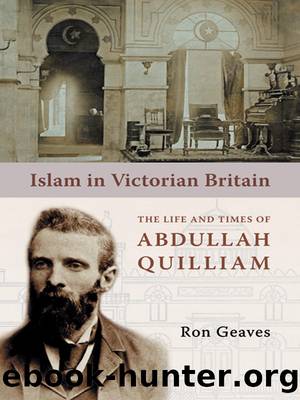Islam in Victorian Britain by Ron Geaves

Author:Ron Geaves
Language: eng
Format: epub
Publisher: Kube Publishing Ltd
Not all Muslims were happy with the proclamation, and Quilliam himself mentions the controversy in Muslim circles and a letter that he received from India which pleaded with him to confine himself to religion and leave politics alone.16 Some Muslims in India, recognising the sensitive and delicate position that they held in India since the failed uprising in 1857, accused him of high treason, while the Muslim Chronicle of India stated that there was no support for such views amongst Indian Muslims.17 Quilliam’s response was controversial, but also revealed that he understood the complexities of separating religion and politics in the Islamic context. He quoted the Prophet on the subject of Muslim unity and stated that, if Muslims were being set against each other to the detriment of the unity of the umma (universal Muslim brotherhood) by the politics of Giaour (infidel) nations, then this became a matter of religion. He declared that the aim of all Muslims should be to work actively for the union of Muslim people and Islam.18 Controversially, he announced that the ultimate religious goal for all Muslim endeavours was the ‘world for Islam’.19
The situation which had aroused Quilliam’s ire in 1896 was the British Expeditionary Force’s entry into Sudan under the command of Major-General Sir Horatio Herbert Kitchener and his utilisation of native Egyptian Muslim troops. General Kitchener had been a Major with the ill-fated Gordon relief column in the 1884-5 campaign in the Sudan,20 and there were those who suspected that one of the motives behind the incursion into Sudan was revenge for Gordon’s death at the hands of the Mahdi.
Egypt had come under British control when the Suez Canal had opened in 1869, and Britain had quickly realised its significance in regard to imperial strategy in the Eastern Mediterranean and the route to India. The route to India and the East was considered vital for reasons of trade, but political and strategic concerns also arose from the expansion of Russian influence that could threaten both the Eastern Mediterranean and British interests in the subcontinent. Egypt was still at least nominally part of the Ottoman Empire, and the Khedive ruled as a viceroy of the Sultan.21 As a result of the American Civil War, Egypt had experienced a cotton boom in the earlier 1860s, which had brought vast profits to her ruler, Khedive Ishmael; but in 1866, all of this collapsed. In 1876, Benjamin Disraeli (1804-1881) seized the opportunity of Egypt’s decline to forestall France and acquire 44% of the Suez Canal shares belonging to the Khedive.22
Egypt was pressured to repay her foreign creditors over a period of sixty-three years, and the Khedive was forced to accept a Prime Minister from America, a Finance Minister from Britain and a Minister of Public Works from France as guarantees of financial solvency. When the Khedive drew upon nationalist sentiments in Egypt to remove these officials, the European powers persuaded the Ottoman Sultan to replace him with his more pliable son, Tewfik. In 1879, Colonel Ahmed Arabi
Download
This site does not store any files on its server. We only index and link to content provided by other sites. Please contact the content providers to delete copyright contents if any and email us, we'll remove relevant links or contents immediately.
| Africa | Asia |
| Canadian | Europe |
| Holocaust | Latin America |
| Middle East | United States |
Fanny Burney by Claire Harman(25784)
Empire of the Sikhs by Patwant Singh(22173)
Out of India by Michael Foss(16312)
Leonardo da Vinci by Walter Isaacson(11903)
Small Great Things by Jodi Picoult(6095)
The Six Wives Of Henry VIII (WOMEN IN HISTORY) by Fraser Antonia(4791)
The Wind in My Hair by Masih Alinejad(4424)
The Lonely City by Olivia Laing(4120)
The Crown by Robert Lacey(4105)
A Higher Loyalty: Truth, Lies, and Leadership by James Comey(4033)
The Iron Duke by The Iron Duke(3639)
Millionaire: The Philanderer, Gambler, and Duelist Who Invented Modern Finance by Janet Gleeson(3569)
Sticky Fingers by Joe Hagan(3454)
Alive: The Story of the Andes Survivors by Piers Paul Read(3311)
Papillon (English) by Henri Charrière(3269)
Joan of Arc by Mary Gordon(3258)
Stalin by Stephen Kotkin(3086)
Aleister Crowley: The Biography by Tobias Churton(3019)
Ants Among Elephants by Sujatha Gidla(2924)
